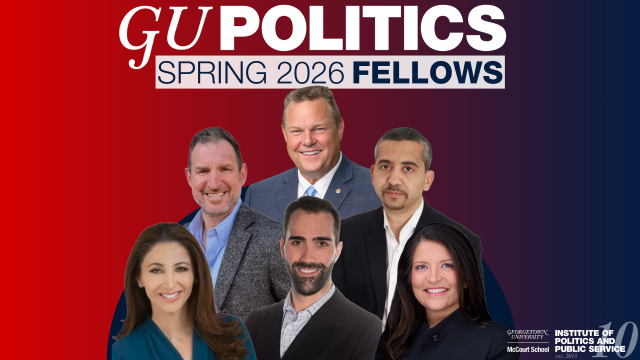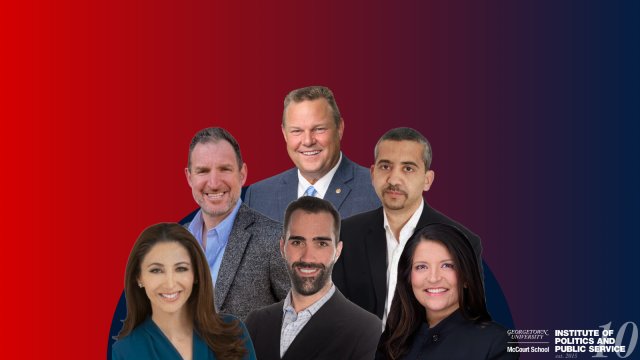Title: New Battleground Civility Poll: Post-Midterms, New Poll Shows Voters Have Deep Concerns Over Threat to Democracy, but for Very Different Reasons
Majority of Americans (95%) believe mutual respect is first step in having a government that works
Washington, D.C. — Just weeks after the fall’s midterm elections, voters feel strongly that the country’s democracy is being threatened. While a lack of respect and civility in politics continues to remain an issue for voters, there’s not a lot of agreement on why Americans feel this way.
According to the latest Georgetown Institute of Politics and Public Service (GU Politics) Battleground Civility Poll, an overwhelming 75% of Americans believe that “democracy is under attack,” as opposed to only 24% who disagree. This belief cuts across party lines with 80% of Democrats, 72% of Republicans and 64% of Independents sharing this concern.
When given a list of reasons why some people say democracy is under attack, voters agree widely on the threat of violence to democracy: 77% of voters agree that “the increasing amount of violent behavior in our society” is an extremely or very serious threat to democracy (including 75% of Republicans and 74% of Democrats). Furthermore, 63% of voters believe that “the decreasing amount of respect and civility in our political system” is an extremely or very serious threat to democracy (including 61% of Republicans and 68% of Democrats).
Beyond that, voters are more divided on other concerns, driven by partisanship and where they get their information:
- 67% of voters believe that “News coverage that favors one political party” is a serious threat to democracy (76% of Republicans, 63% of Independents, 59% of Democrats). Biased news coverage is also seen as an extremely or very serious threat by majorities of voters who watch CNN (64%), Fox News (79%), or MSNBC (67%) on a daily basis.
- 63% of voters believe that “Political candidates who refuse to accept valid election results” is a serious threat to democracy. This item is highly rated as extremely or very serious by Democrats (83%), daily CNN viewers (85%) and daily MSNBC viewers (89%), but of lesser concern to Republicans (42% extremely or very concerned) and daily Fox viewers (50% extremely or very concerned). 60% of Independents saw this issue as extremely or very concerning.
- More than eight-in ten Democrats (81%), daily CNN viewers (85%), and daily MSNBC viewers (86%) see “voter suppression and intimidation” as an extremely or very serious threat. This item is of comparatively less concern as an extremely or very serious threat to Republicans (44%) and daily Fox News viewers (53%). 59% of Independents found this issue extremely or very concerning.
- 49% of voters believe that “voter fraud causing stolen elections” is a serious threat to democracy (71% of Republicans, 44% of Independents, 29% of Democrats). Similarly, 70% of daily Fox viewers see it as a serious threat, as opposed to just 43% of daily CNN viewers and 37% of daily MSNBC viewers.
- 44% of voters believe that “woke culture imposing out of touch liberal values on all of us” is a serious threat to democracy (71% of Republicans, 40% of Independents, 20% of Democrats).72% of daily Fox viewers see this issue as an extremely or very serious threat, compared to 34% of daily CNN viewers and 26% of daily MSNBC viewers.
“It’s clear that Americans are united in their belief that democracy is facing a serious stress test right now,” said Mo Elleithee, Executive Director of the Georgetown Institute of Politics and Public Service. “But understanding how partisanship and news consumption drives very different narratives of why democracy is under assault, is critical to our understanding of how we can restore trust in our institutions.”
The poll showed that voters are concerned about divisive forces yet are ready to embrace political leaders who are willing to engage in increased civility, respect and collaboration. When asked to rate the level of political division in the country on a scale from 0 to 100 where 0 is no division and 100 is division on the edge of a civil war, respondents led to a mean score of 71.00, a slight decline to the mean score 71.74 recorded in July 2022.
When asked to rate the level of political division expected one year from now, respondents expect the temperature to go down slightly with a mean score of 68.4. Democrats are a bit more optimistic expecting the level of divisiveness to drop (-4.1 points) when compared to Independents (-2.8 points) and Republicans (-1 point) who are a bit less optimistic. The middle-class is also following this trend by varying degrees between middle class white voters (70.8 to 68.1), middle class African American voters (74.6 to 68.7) and middle class Hispanic voters (72.9 to 70.4).
Other Key Findings
Respect:
More than eight-in-ten Americans agree about the value of compromise, respect, and civility. Ninety-five percent (95%) believe respect for one another is the first step to having a government that works while ninety-two percent (92%) agree with the statement civility is the language of respect.
Common Ground vs. Fighting the Other Side
Voters once again demonstrated a seeming contradiction, by simultaneously wanting leaders who will compromise and leaders who will stand up to the other side. Strong majorities of voters want compromise and common ground as a goal for their political leaders (65% strongly agree/86% total agree, 6% strongly disagree/13% total disagree) while also agreeing they’re tired of leaders compromising their values and ideals and instead wanting leaders who will stand up to the other side (57% strongly agree/84% total agree, 5% strongly disagree/14% total disagree).
However, when forced to make a choice, voters express a clear preference (68%) for leaders who will compromise to get things done, over leaders who don’t.
Violence:
The poll indicates voters are open to elect leaders who are willing to engage in civil discourse over political violence. Eighty-six percent (86%) of Americans think the main goal of political leaders should be to compromise and find a common-ground while ninety percent (90%) say it is never justified to use violence in order to advance a political or public policy goal. Nearly two years after January 6th, this reveals Americans are ready to move forward and elect leaders willing to work with both parties.
The latest GU Politics Battleground Civility Poll of 800 registered voters was conducted by Republican pollster and former GU Politics Fellow Ed Goeas and Brian Nienaber of the Tarrance Group, and Democratic pollsters Celinda Lake, Daniel Gotoff, Sandra Markowitz, and McCauley Pugh of Lake Research Partners between November 12-17, 2022, and has a margin of error of + 3.5%.
To learn more about the poll, see the questionnaire, charts, tables, and analysis visit: https://politics.georgetown.edu/battleground-poll/
Academics, researchers, and journalists can also access the full dataset to assist in their own research and analyses. [Note: Any use of this data and material must credit the Georgetown Institute of Politics and Public Service Battleground and Civility Poll.]
ABOUT THE GEORGETOWN INSTITUTE OF POLITICS AND PUBLIC SERVICE BATTLEGROUND POLL:
The Georgetown Institute of Politics and Public Service Battleground and Civility Poll is a national bipartisan survey measuring political opinion and civility among registered voters in the United States. Produced by Republican strategist Ed Goeas of The Tarrance Group and Democratic strategist Celinda Lake of Lake Research Partners, this polling series offers unique polling analysis and insights from two top pollsters from different sides of the aisle.
Initiated in June 1991, and housed at GU Politics since April 2019, the Battleground Polls have gained widespread media recognition as reliable bellwethers of national opinion and voters’ intentions. The Battleground data projected the outcome of the 1992, 1996, and 2004 presidential race more precisely than any other similar effort in the country, including those of the major TV networks and national newspapers. In addition, Battleground Polls have consistently been major predictors of what is going to happen in approaching Congressional elections.
With the GU Politics partnership, a Civility Poll was introduced in 2019 to track voter attitudes about polarization in politics.
ABOUT THE INSTITUTE OF POLITICS AND PUBLIC SERVICE:
The Institute of Politics and Public Service (GU Politics) connects and empowers students and the broader community to improve and reimagine politics and public service and reaffirm its promise. Founded as part of the McCourt School of Public Policy in the fall of 2015, GU Politics programming is open to the entire Georgetown community.
ABOUT THE MCCOURT SCHOOL OF PUBLIC POLICY:
The Georgetown University McCourt School of Public Policy is a top-ranked public policy school located in Washington, D.C., the heart of the policy world. The McCourt School’s mission is to teach our students to design, analyze, and implement smart policies and put them into practice in the public, private, and nonprofit sectors, in the U.S. and around the world.
More News

As we hit the halfway point of our 10th anniversary year, we are excited to introduce the Georgetown Institute of Politics and Public Service (GU Politics) Spring 2026…

GU Politics is thrilled to announce a new member joining our Advisory Board. Izzy Klein (C’99) will join a board of public servants, political…
